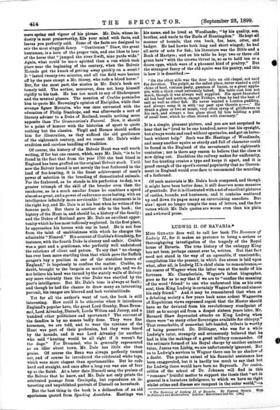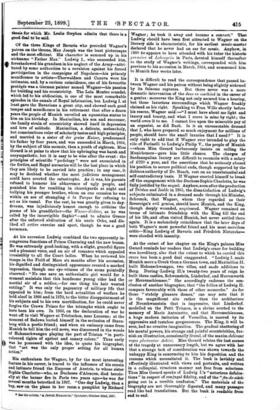LUDWIG II. OF BAVARIA.*
Miss GERARD does well to call her book The Romance of Ludwig II., for it makes no pretence to being a serious or thoroughgoing investigation of the tragedy of the Royal house of Bavaria. The true history of the unhappy King has not been, perhaps cannot ever be, written. But that fact need not stand in the way of an agreeable, if unscientific, compilation like the present, in which due stress is laid upon what, after all, is Ludwig IL's chief claim to remembrance,— his rescue of Wagner when the latter was at the nadir of his fortunes. Mr. Chamberlain, Wagner's latest biographer, goes so far as to say that if we are to "confine the meaning of the word friend' to one who understood him as his own soul, then King Ludwig is certainly Wagner's first and almost his only friend." And it may be remembered that when at a debating society a few years back some ardent Wagnerite of Republican views expressed regret that the Master should have so far deviated from his revolutionary standpoint of 18-IS as to accept aid from a despot sixteen years later, Mr, Bernard Shaw deprecated attacks on King Ludwig when there were "so many other Sovereigns available for obloquy." That remarkable, if somewhat left-handed, tribute is worthy of being preserved. Dr. Dollinger, who was for a while Ludwig's tutor, strangely and erroneously believed that he had in him the makings of a great military commander. Of the estimate formed of his Royal charge by another eminent tutor, Justus von Liebig, we are unfortunately ignorant. But as to Ludwig's services to Wagner there can be no shadow of a doubt. The precise extent of his financial assistance has been exaggerated, but it is hardly too much to say that but for Ludwig there would have been no Bayreuth. Per contra, critics of the school of Dr. Johnson will find in this "romance" fruitful matter to support the thesis that "art in general is a luxurious indulgence, to which we have no right whilst crime and disease are rampant in the outer world,"—a
* The Romance of Ludaly Zr. of Bacaria. By Frances Gerard. With 54 Portraits and. Illustrations. London: kluteldcsou and Co. Lisa]
thesis for which Mr. Leslie Stephen admits that there is a good deal to be said.
Of the three Kings of Bavaria who preceded Wagner's patron on the throne, Max Joseph was the least picturesque and the most efficient. His character is summed up in his nickname "Father Max.' Ludwig I., who succeeded him,
it foreshadowed his grandson in his neglect of the Army—attri- buted by some authorities to a revulsion against his forced participation in the campaigns of Napoleon—his princely munificence to artists—Thorwaldsen and Canova were his intimates, and, by a curious coincidence, one of his favourite proteges was a German painter named Wagner—his passion for building and his eccentricity. The Lola Montez scandal, which led to his abdication, is one of the most remarkable episodes in the annals of Royal infatuation, but Ludwig I. at least gave the Bavarians a great city, and showed such good temper and munificence in his retirement that after a dosen years the people of Munich unveiled an equestrian statue to him on his birthday. In Maximilian, his son and successor, the family strain of eccentricity showed itself in depression and love of solitude. Maximilian, a delicate, melancholy, but conscientious ruler of scholarly tastes and high principles, and married to a sister of der greise Kaiser, predeceased his father by four years, and was succeeded in March, 1864, by the subject of this memoir, then a youth of eighteen. Miss Gerard is at pains to show that his upbringing was harsh and unsympathetic, but it is easy to be wise after the event : the principles of scientific " piedology " were not enunciated in the forties, and Royal nurseries will be the last place in which they are likely to be carried into practice ; in any case, it may be doubted whether the most judicious management could have averted the catastrophe. As it was, his parents refused to humour his abhorrence of ugly people, and punished him for rambling in churchyards at night and bullying his younger brother, whom on one occasion he was within an ace of strangling a la Turque for refusing to act as his vassal. For the rest, he was greatly given to day- dreams, was injudiciously honest enough to criticise the poems of his grandfather—the Trasctr-dichter, as he was called by the incorrigible Saphir*—and to admire Greece after the enforced abdication of his uncle Otho, and dis- liked all active exercise and sport, though he was a good horseman.
At his accession Ludwig combined the two apparently in- congruous functions of Prince Charming and the new broom. He was extremely good-looking, with a slight, graceful figure and a pleasant voice, and an air of romance which appealed irresistibly to all the Court ladies. When he reviewed his troops in the Field of Mars six months after his accession, his dignified and distinguished appearance created a marked impression, though one eye-witness of the scene pointedly observed : "No one save an enthusiastic girl would for a moment maintain that this handsome young rider had the martial air of a soldier,—for one thing his hair wanted cutting." It was only the pageantry of military life that appealed to him; from the hard actualities of warfare he held aloof in 1866 and in 1870, to the bitter disappointment of his subjects and to his own mortification, for he could never forgive the Crown Prince for the triumphs which ought to have been his own. In 1866, on the declaration of war he went off to visit Wagner at Triebschen, near Lucerne; at the moment of Sadowa buried himself in the seclusion of Starn- berg with a poetic friend; and when an emissary came from Munich to tell him the evil news, was discovered in the woods of Hohenschwangau playing the part of Tristan " in parti- coloured tights of apricot and canary colour." Thus early lI was he possessed with the idea, to quote his biographer, that "art was the only proper setting for all human action."
His enthusiasm for Wagner, by far the most interesting feature in his career, is traced to the influence of his cousin and intimate friend the Empress of Austria. to whose sister Sophie Charlotte—who, as Duchesse d'Alencon, died heroic. ally at the bazaar fire in Paris two years ago—he was for several months betrothed in 1867. "One day Ludwig, then a boy, saw on the piano in her room a pamphlet by Richard
* See the article, -.A,Jewlsh Flurnonl 1st," spectator, October 22nd, 1$31% Wagner ; he took it away and became a convert." That Ludwig should have been first attracted to Wagner on the literary side is characteristic, for his earliest music-master declared that he never had an ear for music. Anyhow, in 1860 he appears to have attended with his tutor the historic pit IiiiCte of Lol-ngrin in Paris, devoted himself thereafter to the study of Wagner's writings, corresponded with him previous to his accession in March, 1864, and summoned him to Munich four weeks later.
It is difficult to read the correspondence that passed be- tween Wagner and his patron without being slightly sickened by its fulsome raptures. But there never was a more dramatic intervention of the dens ex machind in the career of a genius : moreover the King not only secured him a hearing, but those luxurious surroundings which Wagner frankly claimed as his right. Speaking to Frau Wille shortly before his rescue, Wagner said :—" I must have about me light and luxury and beauty, and what I crave is mine by right ; the world owes it to me. I cannot live upon the miserable pay of an organist, as did Bach. Is it an unreasonable demand that I, who have prepared so much enjoyment for millions of people, should have the small luxuries that I need ? " It is only right to add that if Wagner ever intended to play the rule of Farinelli to Ludwig's Philip V., the people of Munich --whom Miss Gerard barbarously insists on calling the Municheners—gave him little chance. The charges of Sardanapalian luxury are difficult to reconcile with a salary of £320 a year, and the assertions that he seriously abused his position to secure political ends, though supported by the dubious authority of Dr. Busch, rest on an unsubstantial and self-contradictory basis. If Wagner exerted himself to break off the engagement with the Duchess Sophie Charlotte, he was fully justified by the sequel. Anyhow, soon after the production of Tristan and Isolde in 1865, the dissatisfaction of Ludwig's subjects culminated in a demand made through his Minister, Schrenck, that Wagner, whom they regarded as their Sovereign's evil genius, should leave Munich, and the King, though deeply wounded, acquiesced. Wagner remained on terms of intimate friendship with the King till the end of his life, and often visited Munich, but never settled there again. It is a melancholy coincidence that the later days of both Wagner's most powerful friend and his most merciless critic—King Ludwig of Bavaria and Friedrich Nietzsche— were clouded with insanity.
At the outset of her chapter on the King's palaces Miss Gerard reminds her readers that Ludwig's craze for building was hereditary, also that the extent to which be carried this craze has been a good deal exaggerated. "Ludwig I. made Munich more a Greek than a German town, and Maximilian II. built Hohenschwangau, two villas, and made additions to Berg. During ,Ludwig IL's twenty-two years of reign he built three castles, Schwanstein, Linderhof, and Herrenworth or Herrenschiemsee." She accordingly endorses the con- clusion of another biographer, that "the follies of Ludwig II. compare favourably with those of other monarchs." As for those " stately pleasure domes," one may note that it is the magnificent site rather than the architecture of Neuschwanstein that is impressive, that Linderhof. modelled on the Petit Trianon, is a shrine erected to the memory of Marie Antoinette, and that Herrenschiemsee, a huge modern imitation of Versailles, is marred by its oppressive and tasteless gorgeousness. The King, it will be seen, had no creative imagination. The gradual shattering of his mental powers, his strange and painful eccentricities, fur- nish an illustration, occasionally literal, of the maxim delirant reges pleetvntur Ada' vi. Miss Gerard relates the last scenes of the tragedy at unnecessary length, but we agree with her that a strange lack of consideration was shown towards the unhappy King in announcing to him his deposition and the reasons which necessitated it. The hook is lavishly and effectively illustrated with views and portraits, and written in a colloquial, vivacious manner not free from solecisms. Thus Miss Gerard speaks of Ludwig L's "notorious defalca- tions" in respect of conjugal fidelity, and of the "fin-de-sieele going out in a terrible confusion." The materials of the biography are not thoroughly digested, and many passages read like bad translations. But the book is readable from end to end.



































 Previous page
Previous page